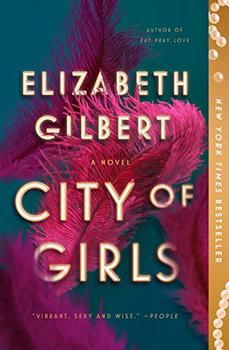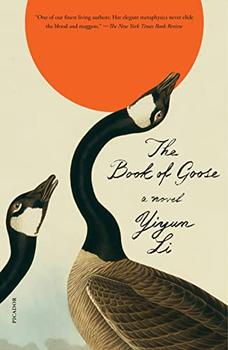Summary | Excerpt | Reading Guide | Reviews | Beyond the book | Read-Alikes | Genres & Themes | Author Bio

A Novel
by Elizabeth GilbertVivian Morris is self-admittedly vapid and sheltered when she first travels to New York City in the summer of 1940— she has just flunked out of Vassar, and her WASP parents have sent her to the city to live with her aunt, who owns a flamboyant midtown theatre. The young woman's bad luck, however, doesn't last long. Vivian, with the help of her trusty sewing machine, soon finds her home in her aunt's theatre and turns the city into her playground.
The novel is written from Vivian's perspective as an elderly woman, writing a letter to a woman named Angela. Angela has asked a simple question that leads to Vivian's novel-length response: who were you to my father? As a result of this narrative structure, the prose is direct and engaging. When Vivian looks back on her youth, she is able to admit her wrongdoings or naiveté; she throws in lessons learned and tells her story unabashedly. There is a certain frankness to her narration that stems from age and distance, and the novel is all the better for it (Vivian's wit is sometimes laugh-out-loud funny). Part of the joy of this perspective is that it allows young Vivian to be self-centered and make mistakes, while the older Vivian is able to provide commentary and context that would otherwise be lacking. For example, much of the story takes place during World War II, and Vivian barely notices the war's emotional toll on those around her—she is worried about boys going to war not for their safety, nor for that of the free world, but because she finds it more difficult to find a date each night. As she ages and realizes the profound impact of this conflict, readers are granted both her youthful opinions and retrospective reflections.
While New York City is a common backdrop in American coming-of-age fiction, Gilbert creates a beautiful rendition of it in City of Girls. She delves into the opulence of nightlife, but she also explores the changing landscape of the city during war rationing and as women take up factory jobs. As Vivian ages, the city also changes and evolves. However, despite the care spent developing a 1940s New York, not all of the novel feels as well-realized. Most of the plot occurs between 1940-1945, but toward the end, the narration rapidly shifts forward through time. Coming from the perspective of an elderly woman, Vivian has a lot of life to recount— since her relationship with Angela's father formed during wartime, however, that is the period of her life she focuses on most. After the forties, relevant scenes are given to round out the story. Unfortunately, Vivian's later years are not as engaging as her earlier ones; there are more moments of summary than scene, and fewer members of the supporting cast stand out. That is not to say the ending is disappointing, but the novel is predominantly a coming-of-age story; once Vivian has grown into herself, the story's central conflict has been resolved.
The supporting cast of characters works wonderfully. They are both independently interesting and essential in developing Vivian into the woman she becomes. Gilbert renders the female characters especially well, and they each support the underlying theme that there is a difference between being the woman society expects and being a good person. The novel offers many examples of intimacy, love, and friendship, and it manages to stay lighthearted even in trying times. Despite the latter parts slowing down, City of Girls is a funny, charming coming-of-age story told by a woman who has lived a full life.
![]() This review was originally published in The BookBrowse Review in June 2019, and has been updated for the
April 2020 edition.
Click here to go to this issue.
This review was originally published in The BookBrowse Review in June 2019, and has been updated for the
April 2020 edition.
Click here to go to this issue.

If you liked City of Girls, try these:

by Mischa Berlinski
Published 2025
An exuberant, darkly humorous novel by the National Book Award–nominated author of Fieldwork.

by Yiyun Li
Published 2023
A magnificent, beguiling tale winding from the postwar rural provinces to Paris, from an English boarding school, to the quiet Pennsylvania home where a woman can live without her past, The Book of Goose is a story of disturbing intimacy and obsession, of exploitation and strength of will, by the celebrated author Yiyun Li.
Your guide toexceptional books
BookBrowse seeks out and recommends the best in contemporary fiction and nonfiction—books that not only engage and entertain but also deepen our understanding of ourselves and the world around us.